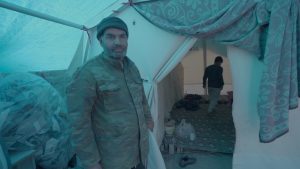Tuesday February 6, 2024
One year ago, Türkiye and Syria faced a devastating earthquake, swiftly followed by hundreds of aftershocks and another deadly quake. Reflecting on the resilience and hardships of survivors, Shahin Ashraf, Islamic Relief’s head of global advocacy, calls for support with sustained aid and recovery.
The earthquake of 6 February 2023 exacerbated challenges faced by communities in dire need. The 11 provinces in Türkiye’s southern region, already battling high poverty rates, became epicentres of devastation. Meanwhile, in Syria’s crisis-ridden northwestern region, where 90% of the population relied on humanitarian aid, the earthquake added another layer of hardship.
The earthquake news from Türkiye and Syria sent a shiver down my spine, triggering memories of my own unsettling experience. In the eerie stillness just before morning prayer at 4:31am on 17 January 1994, a deep rumbling noise, resembling the approach of a distant train, pierced the silence, accompanied by violent shaking. The chilling sounds of my neighbours’ screams and distant voices urgently declaring, “Earthquake!”
In 2023, hearing about the earthquake instantly transported me back to that morning in Los Angeles, USA. While I can’t fully comprehend the experiences of those affected in Türkiye and Syria, I resonate with the lingering feelings that accompany such profound events. The haunting memories, displacement, and rebuilding process echo my own journey.
In this shared resonance of resilience and recovery, a universal understanding emerges, transcending geographical boundaries and cultural differences. Reflecting on seismic events that shape our lives globally. The threads of fear, uncertainty, and the resilience needed to navigate the aftermath of disasters bind us as a global community. The empathy stirred by these news reports reminds me of our interconnectedness and the fragility of the ground we stand upon.
I couldn’t help but feel a kinship with those facing the daunting task of rebuilding. The road ahead is undoubtedly challenging, marked by physical reconstruction and emotional healing. However, my own experience has taught me that the human spirit is remarkably resilient.
The human toll
The preexisting vulnerabilities of these regions intensified the impact of the earthquake, creating a profound humanitarian crisis.
For example, even before the earthquakes, increasing pressures on water sources in Türkiye and Syria due to climate change impacts, population growth, and socio-political considerations were evident. With the damage to infrastructure caused by the earthquakes, water scarcity is now an even more pressing problem.
The earthquakes and aftershocks claimed over 50,000 lives and left more than 100,000 injured. The numbers speak of tragedy. According to a stark damage assessment study by Ministry of Environment, Urbanisation and Climate Change, over 50,000 homes were destroyed, thrusting a significant portion of the population into displacement and homelessness.
Picture this: more than 3 million people found themselves displaced in Türkiye alone, with 2.6 million individuals seeking refuge in temporary settlements that lacked the essentials: clean water, sanitation, and healthcare. These were not just statistics; they were the stories of shattered lives, families torn from their homes, grappling with the harsh reality of inadequate living conditions.
Venture into northwestern Syria, and the toll became even more heartrending. In a region where more than 2.74 million were already displaced, nearly 109,000 individuals were further uprooted by the earthquake’s devastating force.
The infrastructure damage in Syria was compounded by the scars of previous crises. Buildings broken and battered by the earthquake were already weakened, cracked by the intensity of past shelling. It was a tragic overlap of 2 calamities, leaving traumatised communities grappling not just with the consequences of nature’s fury but also the lingering wounds of human violence.
I was incredibly moved by the story of Ahmad, a Syrian refugee, who lived in a peaceful village before fleeing to Türkiye in search of safety:
“With each passing day, our village transformed from a haven of peace into a tapestry of chaos and despair. Work ceased, and food became scarce, forcing us into a nomadic life, moving from one village to another in search of safety,” Ahmad said, describing his ordeal to Islamic Relief.
As the situation worsened, Ahmad said his family made “the heart-wrenching decision to leave everything behind” as they set off on a dangerous journey to neighbouring Türkiye. He described the language barrier as the greatest trial, “an invisible wall standing between them and their new home.” But still, they felt safer there than at home in Syria – until 6 February 2023.
“The earthquake struck without warning, shaking the very foundations of our home. We rushed outside, watching in horror as the earth convulsed. Our house, our sanctuary, crumbled before our eyes, but thankfully, our lives were spared.”
